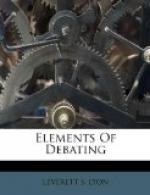A further objection to force is that you impair the object by your very endeavor to preserve it. The thing you fought for is not the thing which you recover; but depreciated, sunk, wasted, and consumed in the contest. Nothing less will content me than whole America. I do not choose to consume its strength along with our own, because in all parts it is the British strength that I consume. I do not choose to be caught by a foreign enemy at the end of this exhausting conflict; and still less in the midst of it. I may escape; but I can make no insurance against such an event. Let me add that I do not choose wholly to break the American spirit: because it is the spirit that has made the country.
Lastly, we have no sort of experience in favor of force as an instrument in the rule of our Colonies. Their growth and their utility has been owing to methods altogether different. Our ancient indulgence has been said to be pursued to a fault. It may be so. But we know, if feeling is evidence, that our fault was more tolerable than our attempt to mend it; and our sin far more salutary than our penitence.
2. Wells’s Geometry gives the following proposition: “Two perpendiculars to the same straight line are parallel.” The evidence given is: “If they are not parallel, they will, if sufficiently produced, meet at some point, which is impossible, because from a given point without a straight line but one perpendicular can be drawn.” Is this evidence sufficient to constitute proof? Does it convince you? Why, or why not?
3. Set down as much evidence as you can think of in ten minutes, to convince a business man that a high-school education is an advantage in business life.
4. Support the statement that football has benefited or harmed this school, with five truthful statements that are evidence. Indicate which ones would be most effective, if you were speaking to the students, and which would make the strongest impression on the faculty.
5. In the following statements of testimony, tell which ones would be good evidence and which not. Tell why or why not in each case.
(1) X, a student, was told
that unless he should point out the pupil
who had put matches on the
floor, he would be expelled. X then said
that Y was guilty.
(2) James Brown, a teamster,
asserts that the use of alcohol is
beneficial to all persons.
(3) John Burns, a labor leader,
declares that labor unions are
beneficial to trade.
(4) F. W. McCorkle, a large
manufacturer, states that labor unions
have proved beneficial to
commerce.
(5) Professor Sheldon, a college
president and profound student of
economics, has declared that
labor unions help the trade of the
world.




